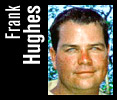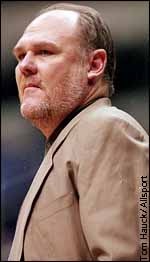
| ||||||||||||
ALSO SEE Fouled Out: MJ, Wiz have a history Fouled Out: MJ, Wiz have a history Fouled Out: Snap out of it, MJ Fouled Out: Snap out of it, MJ Fouled Out: I once was a roto geek Fouled Out: I once was a roto geek | ||||
| ESPN.com NFL | ||||
 | Monday, January 31 For better or worse, Karl made things fun in Seattle Special to ESPN.com | |||
George Karl is one of the most demanding, neurotic, emotional, manipulative, hard-driven, difficult, conflicted people you ever will meet.
He also is one of the most fun-loving, generous, loveable and devoted people you ever will meet. When Karl visits Seattle's KeyArena Saturday night with his new team, the Milwaukee Bucks, for the first time since unceremoniously departing the Sonics organization two seasons ago, there will be one person. But there will be both people.
 | |
| Things were never boring in Seattle when George Karl was in town. |
All of a sudden, his son, Coby, and four of Coby's friends come barreling into the already-crowded office and plop down on the couch. One of the friends, in typical teenage fashion, is wearing godawful pink pants. Forty-five minutes before tipoff, and George gets into an argument with this kid about how terrible the pants look. In what other NBA coach's office will you witness that scene?
There is another story about traveling that is vintage George Karl, that makes him unique, memorable, unforgettable. When the team was on the bus, Karl liked to pop in game tape on the video system so players could get an idea of their next opponent. By the middle of the season, players were getting cranky, they were growing weary of so much game tape and they started complaining. So Karl had the team's video coordinator splice scenes from a pornographic movie into the game film. Twenty seconds of game film, five seconds of XXX movie. Thirty seconds of game film, 10 seconds of spicy film. Forty seconds of game film, 15 seconds of va va va voom. You better believe every player and coach on that bus was intently watching that game film. (I won't use names, but as a humorous aside, it turned out one of the players on the bus knew, on a, ahem, personal level, one of the women in the movie.) Karl also is exceedingly superstitious, and in Seattle he dragged equipment manager Marc St. Yves along with him in his quest of getting a supernatural edge. For instance, Karl did not want to be notified how much time there was before tipoff. There is a clock in each locker room that counts down to the game, and Karl did not want to leave the locker room until there was 3:59 left on the clock. It was St. Yves' job to scream out "3:59" each night. In San Antonio a few years back, a couple uniforms were stolen, so St. Yves had to go to the airport before the game to pick up new uniforms being shipped in. When he returned, Karl gave him grief because he was not there to yell, "3:59." At the All-Star game in 1997-98, when Karl was the coach of the Western Conference team, St. Yves was not working, but he made it a point to get a locker room pass, sneak in and yell, "3:59" before the game. "It was endearing," St. Yves said. "We still have fun with it. When we were in Milwaukee last week, (assistant coach) Bob Weiss wanted me to go over to the Bucks' locker room and yell, '3:59.'" Another Karl idiosyncracy is that before games, players wrap up their valuables in ankle tape and put them in a collective bag for safekeeping. But Karl never liked to put his stuff in the bag. He made St. Yves hold it. He would throw it to him before the game, and if St. Yves dropped it, Karl believed the Sonics would lose that game. So much for preparing for the pick-and-roll. But that is exactly the conflict with Karl. He lives and breathes basketball, almost to the point of obsession. He watches endless amounts of game film, talks the game, is a disciple of it. He doesn't need silly superstitions to make his team better, and yet he is so uncertain of the things he can't control that he has to employ additional aids. In the end, that uncertainty got the better of him, at least in Seattle. He could not live with Walker and owner Barry Ackerley not giving him that contract extension in his final year, which in his mind was more a vote of confidence than anything else.It ate him up, it tortured him, in a way it possessed his soul because he could not let it go.
And it's a shame that his era in Seattle ended that way, with infighting and bickering and backstabbing and political maneuvering, because there was so much success that an ugly ending was not necessary. In a way, it is best the Bucks did not play in Seattle last season so Karl did not allow Sonics fans, his fans, to see the vindictive side of his character. It is best that the bad feelings never were allowed to be vented, at least not in the town itself. He said things in newspapers, but it always was at a distance.But the anger, it seems, is gone. He no longer feels the need to lash out at Walker, spew venom at the mention of Walker's and Ackerley's names. He has come to a sort of peace, with himself and with his lot in life.
Now, like McMillan and St. Yves and Payton and every other person who passed through Seattle and was touched by Karl, their time together has become fond memories. The bad ones, appropriately, filtered out with time. That's the way it should be.Frank Hughes covers the NBA for the Tacoma (Wash.) News-Tribune. He is a regular contributor to ESPN.com.
|
ESPN INSIDER
Copyright 1995-2000 ESPN/Starwave Partners d/b/a ESPN Internet Ventures. All rights reserved. Do not duplicate or redistribute in any form. ESPN.com Privacy Policy. Use of this site signifies your agreement to the Terms of Service. | ||||